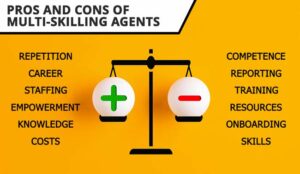The debate between single-skilling and multi-skilling agents has always been raging, but it’s never been a more prevalent issue, as Garry Gormley, Founder of FAB Solutions, explains:
“Now that a lot more contact centres are cloud based, hybrid / remote, and omnichannel, this gives the capability for us to operate wherever and across whatever channel, which unfortunately makes choices about how to resource your team more complicated.”
So, when the temptation is to multi-skill, is it really the best option? To find out, we asked our consultants panel to bring you the pros and cons of multi-skilling agents.
Here’s what they said…
The Benefits of Multi-Skilling Your Agents
Multi-Skilling Stops Customers Having to Repeat Themselves

From a customer’s perspective, having a single agent handle their request is paramount.
Transferring between agents prolongs call time and often necessitates repeating authentication and the issue explanation, which frustrates both the customer and the agent.
Contributed by: Neil Linford-Relph, Founder of The Design Business
It Provides a Clear Career Path for Agents (Improving Staff Retention)

Agents who are given the time and support to learn more about a business are more likely to stay for longer.
Also, introducing a structured learning and development programme within the business, with clearly defined steps, provides a career path for agents.
Celebrating the achievement of each of these steps, or milestones, provides the agents with the recognition and satisfaction of knowing that they are progressing well within the contact centre.
If the contact centre does this well, generally agents won’t begin to look elsewhere for opportunities until they have completed the journey they have started.
Contributed by: Dara Kiernan, leadership development and contact centre consultant
Agents Are More Likely to Get Their PTO Requests Approved
When agents are multi-skilled, planners can schedule agents where they are most needed – without being constrained by limited skill sets. That allows higher efficiency and faster average speed of answer.
It helps agents as well, since that added flexibility means they are more likely to get PTO (personal time off) requests approved, since there is a larger pool of qualified agents to backfill their absence.
Contributed by: Mike Aoki, President, Reflective Keynotes Inc.
Multi-Skilling Helps Break Down Departmental Silos

In a previous company where we initially had rigid, channel-segregated departments that were compromising the customer journey, the solution was to blend the teams, assigning each department a core skill set for 80% of their workload, with 20% allocated to a blended skill.
This approach enabled outbound and digital departments to handle inbound calls during peak times, providing an overflow escape valve.
All teams could send emails, SMS, and handle digital conversations, aiming to direct enquiries back to the original responding agent.
This flexibility allowed for variation in agents’ work, improved handling of interaction spikes, and broke down departmental silos.
Contributed by: Alex McConville, Founder, Contact Centre Consultant and author of ‘Diary of a Call Centre Manager’
It Helps to Minimize Overstaffing or Understaffing

From a management perspective, multi-skilling improves workforce management efficiency.
It allows for better scheduling and capacity planning, as managers can deploy agents across different queues, channels or even clients based on real-time data and demand forecasts.
This proactive approach minimizes overstaffing or understaffing, optimizing operational costs while maintaining service levels.
Contributed by: Dan Pratt, Founder & Director DAP Consultancy
It Empowers Agents to Respond to Customers on a Case-by-Case Basis

The key point when it comes to customer service skills is to understand that it is all about applying them on a case-by-case basis – based on the situation the agent is facing.
As this is what customer service is really about: making it outstanding by constantly adapting yourself to the situations you are in and the customer you have to deal with.
That’s why an agent knowing the wide range of different situations they can face when handling your customers, and having a wide range of skills related to that, is crucial.
Contributed by: Pierre Bauzee, Founder of Beyond Satisfaction
Cross-Trained Agents Will Learn How Your Services Work Together

Agents will learn how various products and services work together once they are cross-trained on those queues. That helps them gain a broader perspective on your offerings.
It also provides more variety in the type of calls they receive. So they are not always answering the same questions on the same products, every time.
Contributed by: Mike Aoki, President, Reflective Keynotes Inc.
There’s a Reduced Cost to Serve as Agents Are Able to Flex Against Channels
Multi-skilled agents can handle a variety of tasks across different channels. This includes the most popular (in a lot of cases, the phone) but also extends to email, chat, and social media if you have this online.
You ideally want to be able to flex resources dynamically where the need is greatest to ensure high levels of customer satisfaction. This also has a knock-on impact in the cost to serve as agents are able to flex against channels.
Contributed by: Garry Gormley, Founder of FAB Solutions
The Downsides of Multi-Skilling
Rarely Using Additional Skills Can Lead to a Decline in Competence Over Time

One common pitfall with multi-skilling is training your agents to assist during peak times, but rarely utilizing them in these areas of your business, which leads to a decline in their competence over time.
Contributed by: Irina Mateeva, WFM Transformation Consultant and Founder of RightWFM
Reporting Must Be Set Up Correctly to Avoid Friction
Reporting must be set up correctly to avoid friction and skewed KPI measurements.
Without proper metrics, it can be challenging to balance the increased average handling time of multi-skilled agents against their primary skill expectations.
Contributed by: Alex McConville, Founder, Contact Centre Consultant and author of ‘Diary of a Call Centre Manager’
It Makes Training and Resource Planning Almost Impossible

I once worked for a very well-known digital business and was part of their senior operations leadership team as L&D Manager. This involved the day-to-day running of the contact centre.
This was a multichannel offering – calls, emails, and chat across a variety of platforms and products.
The agents were expected to learn all platforms, products and systems, which caused a lot of negativity and friction.
This also made training and resource planning almost impossible in an ever-changing environment.
Contributed by: Jim Oldroyd of Bread and Butter Learning Solutions
You Risk Overwhelming Agents With Too Much Too Soon

Whilst I advocate multi-skilling, I also think a graduated training and adoption of these tools based on agent experience levels is important to ensure we don’t overwhelm agents.
Having a clear systems, onboarding and training process is essential to get this right and deliver great customer satisfaction and great agent outcomes.
Contributed by: Garry Gormley, Founder of FAB Solutions
You Will Still Need to Maintain a Dominant Skill for Each Agent
A key point I’ve found in multi-skilling is maintaining a dominant or specialized skill for each agent. This ensures that while agents are versatile, they still have an area of specialism.
Contributed by: Alex McConville, Founder, Contact Centre Consultant and author of ‘Diary of a Call Centre Manager’
You Need to Understand ‘Rocks’ and ‘Pebbles’ to Truly Optimize Handling
Definitions of both single-skilled and multi-skilled agents need to have ‘simple pebbles’ and ‘complex rocks’ added as a further dimension.
The difference is set by the level of training, knowledge base, and tools being considered, as Peter Massey, MD & co-founder at Budd UK Ltd, explains:

“Multi-skill the first line with either people, IVR, online, or AI. These are a whole range of the simpler queries which can be one and done. Give staff and customers confidence that they can hand off complex queries straight away to experts without faffing about.
“Then single-skill the remaining complex queries with specialists. The contacts will be escalated quickly from the frontline given good triage questions.
“The caveat is scale – having enough specialists required and available. This approach maximizes throughput and resolution. And it minimizes hassle for customers.”
There Will Always Be Occasions When Single-Skilling Is the Right Choice
A quick headcount of responses clearly shows that the positives outweigh the negatives when it comes to deploying a multi-skilling strategy.
However, a single-skilling strategy should never be discounted from consideration – as there are benefits to this approach too!
- The Pros and Cons of Single-Skilling Agents
- Should We Multi-Skill or Single Skill Our Advisors?
- 20 Tips to Multi-Skill Your Contact Centre
Author: Megan Jones
Reviewed by: Xander Freeman
Published On: 28th Aug 2024 - Last modified: 18th Sep 2025
Read more about - Call Centre Management, Alex McConville, Dan Pratt, Dara Kiernan, Garry Gormley, Irina Mateeva, Jim Oldroyd, Management Strategies, Mike Aoki, Multi-Skilling, Neil Linford-Relph, Peter Massey, Pierre Bauzee, Skill Development, Top Story















